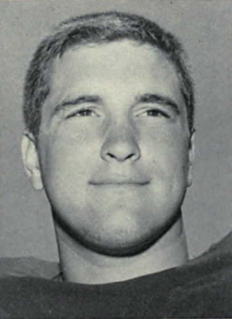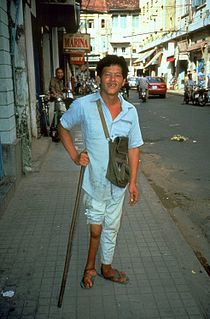Daniel Lee Dierdorf is an American sportscaster and former football offensive lineman.
Glen Ray Hines was an All-Pro (AFL) and NCAA All-American football player.
The 1977 Arkansas Razorbacks football team represented the University of Arkansas in the Southwest Conference (SWC) during the 1977 NCAA Division I football season. In their first year under head coach Lou Holtz, the Razorbacks compiled an 11–1 record, finished in second place in the SWC, and outscored their opponents by a combined total of 389 to 101. The Razorbacks' only loss was to SWC champion Texas by a 13–9 score. The team advanced to 1978 Orange Bowl, defeating #2 Oklahoma by a 31–6 score. Arkansas was ranked #3 in both the final AP Poll and the final UPI Coaches Poll.
The 1979 Arkansas Razorbacks football team represented the University of Arkansas in the Southwest Conference (SWC) during the 1979 NCAA Division I-A football season. In their third year under head coach Lou Holtz, the Razorbacks compiled a 10–2 record, finished in a tie with Houston for the SWC championship, and outscored their opponents by a combined total of 284 to 132. The Razorbacks' only regular season loss was to Houston by a 13–10 score. The team advanced to the 1980 Sugar Bowl, losing to undefeated national champion Alabama by a 24–9 score. Arkansas was ranked #8 in the final AP Poll and #9 in the final UPI Coaches Poll.
The 1989 Arkansas Razorbacks football team represented the University of Arkansas during the 1989 NCAA Division I-A football season. In Ken Hatfield's final year at UA, the Razorbacks went 10–2, and won their second straight SWC championship. However, Arkansas lost their fourth-straight bowl game and second consecutive Cotton Bowl Classic.
The 1964 Arkansas Razorbacks football team was an American football team that represented the University of Arkansas in the Southwest Conference (SWC) during the 1964 NCAA University Division football season. In their seventh year under head coach Frank Broyles, the Razorbacks compiled an undefeated 11–0 record, won the SWC championship, closed the regular season with five consecutive shutouts, outscored all opponents by a combined total of 231 to 64, and defeated Nebraska in the Cotton Bowl.
The 1969 Sugar Bowl featured the fourth-ranked Georgia Bulldogs, and the ninth-ranked Arkansas Razorbacks. Chuck Dicus was named Sugar Bowl MVP after catching 12 passes.
The 1959 Arkansas Razorbacks football team represented the University of Arkansas in the Southwest Conference (SWC) during the 1959 NCAA University Division football season. In their second year under head coach Frank Broyles, the Razorbacks compiled a 9–2 record, finished in a tie with Texas for the SWC championship, and outscored all opponents by a combined total of 163 to 101. The Razorbacks' only losses came against Texas by a 13–12 score and to Mississippi by a 28–0 score. The team was ranked #9 in both the final AP Poll and the final UPI Coaches Poll and went on to defeat Georgia Tech in the 1960 Gator Bowl by a 14–7 score. Halfback Jim Mooty was selected by the Associated Press as a first-team player on the 1959 All-America Team.
The 1961 Arkansas Razorbacks football team represented the University of Arkansas in the Southwest Conference (SWC) during the 1961 NCAA University Division football season. In their fourth year under head coach Frank Broyles, the Razorbacks compiled an 8–3 record, finished in a tie with Texas for the SWC championship, and outscored all opponents by a combined total of 183 to 97. The Razorbacks' only losses during the regular season came against Mississippi by a 16–0 score and to Texas by a 33–7 score. The team was ranked #9 in the final AP Poll and #8 in the final UPI Coaches Poll and went on to lose to the undefeated national champion Alabama Crimson Tide in the 1962 Sugar Bowl by a 10–3 score.
The 1962 Arkansas Razorbacks football team represented the University of Arkansas in the Southwest Conference (SWC) during the 1962 NCAA University Division football season. In their fifth year under head coach Frank Broyles, the Razorbacks compiled a 9–2 record, finished in second place in the SWC, and outscored all opponents by a combined total of 299 to 115. The Razorbacks' only loss during the regular season came against Texas by a 7–3 score. The team was ranked #6 in both the final AP Poll and the final UPI Coaches Poll and went on to lose to Ole Miss in the 1963 Sugar Bowl by a 17–13 score.
The 1968 Arkansas Razorbacks football team represented the University of Arkansas in the Southwest Conference (SWC) during the 1968 NCAA University Division football season. In their 11th year under head coach Frank Broyles, the Razorbacks compiled a 10–1 record, won the SWC championship, and outscored all opponents by a combined total of 350 to 189. The team finished the season ranked #6 in the final AP Poll and #9 in the final UPI Coaches Poll and went on to defeat Georgia in the 1969 Sugar Bowl. Offensive guard Jim Barnes was selected by the AP and Central Press as a first-team player on the 1968 College Football All-America Team.
The 1969 Texas Longhorns football team represented the University of Texas at Austin in the 1969 NCAA University Division football season. The Longhorns won all eleven games to win their second consensus national championship; the first was six seasons earlier in 1963.
The 1965 College Football All-America team is composed of college football players who were selected as All-Americans by various organizations that chose College Football All-America Teams in 1965.
The 1970 Sugar Bowl was a post-season college football bowl game between the Arkansas Razorbacks and the Ole Miss Rebels. In the thirty-sixth Sugar Bowl, #13 Ole Miss upset #3 Arkansas, 27–22.

Dick G. Bumpas is a retired American football coach and former player. He was an All-American defensive tackle at Arkansas and an assistant football coach at several college football programs, most notably an 11-year stint as the defensive coordinator at TCU.

The 2015 Arkansas Razorbacks football team represented the University of Arkansas during the 2015 NCAA Division I FBS football season. The Razorbacks played their home games at Donald W. Reynolds Razorback Stadium in Fayetteville and War Memorial Stadium in Little Rock. They competed as a member of the Western Division of the Southeastern Conference. Arkansas was led by third-year head coach Bret Bielema. Dan Enos served his first season as offensive coordinator, replacing Jim Chaney who left for a job with Pittsburgh. Enos was previously the head coach of Central Michigan.
The 2002 All-SEC football team consists of American football players selected to the All-Southeastern Conference (SEC) chosen by the Associated Press (AP) and the conference coaches for the 2002 NCAA Division I-A football season.









